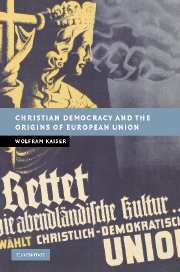Book contents
- Frontmatter
- Contents
- Acknowledgements
- Abbreviations
- Introduction
- 1 All paths to Rome? Transnational Catholicism in the nineteenth century
- 2 Under siege: Catholic parties in interwar Europe
- 3 After Versailles: left-Catholic cooperation
- 4 In the shadow of dictatorship: contacts in exile
- 5 Hegemony by default: Christian democracy in postwar Europe
- 6 Creating core Europe: the rise of the party network
- 7 Deepening integration: the supranational coalition embattled
- 8 Informal politics: from Rome to Maastricht
- Bibliography
- Index
- NEW STUDIES IN EUROPEAN HISTORY
3 - After Versailles: left-Catholic cooperation
Published online by Cambridge University Press: 14 July 2009
- Frontmatter
- Contents
- Acknowledgements
- Abbreviations
- Introduction
- 1 All paths to Rome? Transnational Catholicism in the nineteenth century
- 2 Under siege: Catholic parties in interwar Europe
- 3 After Versailles: left-Catholic cooperation
- 4 In the shadow of dictatorship: contacts in exile
- 5 Hegemony by default: Christian democracy in postwar Europe
- 6 Creating core Europe: the rise of the party network
- 7 Deepening integration: the supranational coalition embattled
- 8 Informal politics: from Rome to Maastricht
- Bibliography
- Index
- NEW STUDIES IN EUROPEAN HISTORY
Summary
Among the Catholic parties in Europe, the Italian PPI was the only one to quickly develop a keen interest in foreign policy shortly after the end of World War I. Organised transnational cooperation of Catholic parties played an important role in their concept of a more peaceful European order. Already at the party congress in Bologna in June 1919, Achille Grandi proposed that the PPI should initiate such transnational contacts, although it appears that he was still thinking more in terms of trade union cooperation. One month after the national elections, in which the PPI came second to the Socialists, the party executive resolved to establish bilateral contacts with other Catholic and ‘popular’ parties with the aim of creating a ‘popular international’. Subsequently, in May 1920, the PPI congress passed a motion calling for such formalised transnational party cooperation. Sturzo strongly pushed for the establishment of foreign links, together with other leading Popolari. They included, inter alia, Cavazzoni, the conservative leader of the PPI parliamentary party 1919–22, and Livio Tovini, vice-president of the newly elected parliament. Also interested in transnational party cooperation were De Gasperi, parliamentary party leader 1922–4, party leader 1924–6 and Italian prime minister after World War II, and Rufo Ruffo della Scaletta, who presided over the PPI foreign policy committee and was elected to the party executive in November 1921. Like Sturzo, these last two Popolari had closer contacts with the German-speaking world. De Gasperi was a member of the Austrian Reichrat parliament from 1911 to 1918.
- Type
- Chapter
- Information
- Christian Democracy and the Origins of European Union , pp. 72 - 118Publisher: Cambridge University PressPrint publication year: 2007



